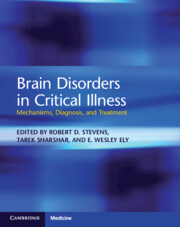
-
Select format
-
- Publisher:
- Cambridge University Press
- Publication date:
- 05 October 2013
- 19 September 2013
- ISBN:
- 9781139248822
- 9781107029194
- Dimensions:
- (234 x 156 mm)
- Weight & Pages:
- 1.18kg, 456 Pages
- Dimensions:
- Weight & Pages:
You may already have access via personal or institutional login
Book description
Brain dysfunction is a major clinical problem in intensive care, with potentially debilitating long-term consequences for post-ICU patients of any age. The resulting extended length of stay in the ICU and post-discharge cognitive dysfunction are now recognized as major healthcare burdens. This comprehensive clinical text provides intensivists and neurologists with a practical review of the pathophysiology of brain dysfunction and a thorough account of the diagnostic and therapeutic options available. Initial sections review the epidemiology, outcomes, relevant behavioral neurology and biological mechanisms of brain dysfunction. Subsequent sections evaluate the available diagnostic options and preventative and therapeutic interventions, with a final section on clinical encephalopathy syndromes encountered in the ICU. Each chapter is rich in illustrations, with an executive summary and a helpful glossary of terms. Brain Disorders in Critical Illness is a seminal reference for all physicians and neuroscientists interested in the care and outcome of severely ill patients.
Reviews
'The chapters are concise, well written, and well organized … This very strong and well-referenced basic science text covers a broad range of topics including neuroanatomy, neurophysiology, and biochemistry, and delivers a solid foundation that clinicians can translate to an increased understanding of brain dysfunction at bedside.'
Source: Canadian Journal of Anesthesia
Contents
Metrics
Altmetric attention score
Full text views
Full text views help Loading metrics...
Loading metrics...
* Views captured on Cambridge Core between #date#. This data will be updated every 24 hours.
Usage data cannot currently be displayed.
Accessibility standard: Unknown
Why this information is here
This section outlines the accessibility features of this content - including support for screen readers, full keyboard navigation and high-contrast display options. This may not be relevant for you.
Accessibility Information
Accessibility compliance for the PDF of this book is currently unknown and may be updated in the future.


